m4复习
外研社四年级上册M4复习
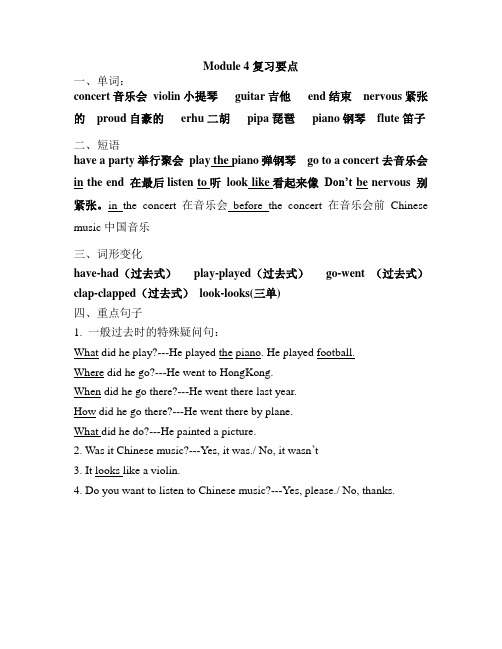
Module 4复习要点一、单词:concert音乐会violin小提琴guitar吉他end结束nervous紧张的proud自豪的erhu二胡pipa琵琶piano钢琴flute笛子二、短语have a party举行聚会play the piano弹钢琴go to a concert去音乐会in the end 在最后listen to听look like看起来像Don’t be nervous 别紧张。
in the concert在音乐会before the concert 在音乐会前Chinese music中国音乐三、词形变化have-had(过去式)play-played(过去式)go-went (过去式)clap-clapped(过去式)look-looks(三单)四、重点句子1. 一般过去时的特殊疑问句:What did he play?---He played the piano. He played football.Where did he go?---He went to HongKong.When did he go there?---He went there last year.How did he go there?---He went there by plane.What did he do?---He painted a picture.2. Was it Chinese music?---Yes, it was./ No, it wasn’t3. It looks like a violin.4. Do you want to listen to Chinese music?---Yes, please./ No, thanks.。
广州版英语六年级上第二单元(M3和M4)综合复习与练习
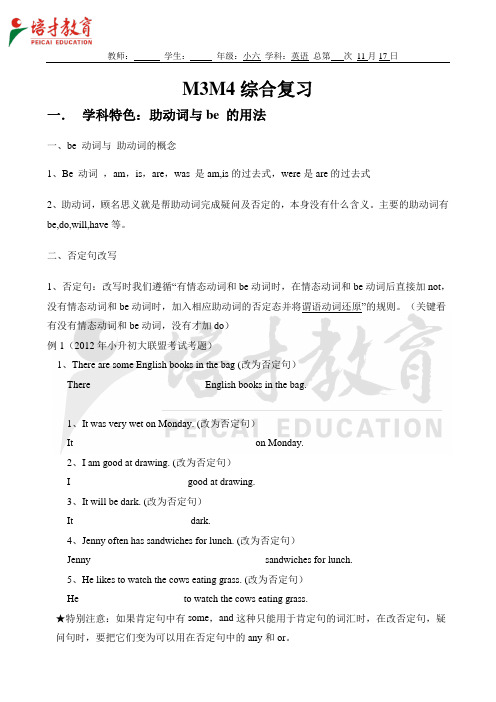
M3M4综合复习一.学科特色:助动词与be 的用法一、be 动词与助动词的概念1、Be 动词,am,is,are,was 是am,is的过去式,were是are的过去式2、助动词,顾名思义就是帮助动词完成疑问及否定的,本身没有什么含义。
主要的助动词有be,do,will,have等。
二、否定句改写1、否定句:改写时我们遵循“有情态动词和be动词时,在情态动词和be动词后直接加not,没有情态动词和be动词时,加入相应助动词的否定态并将谓语动词还原”的规则。
(关键看有没有情态动词和be动词,没有才加do)例1(2012年小升初大联盟考试考题)1、There are some English books in the bag (改为否定句)There ________ ___________ English books in the bag.1、It was very wet on Monday. (改为否定句)It ________ __________ __________ on Monday.2、I am good at drawing. (改为否定句)I ________ __________ good at drawing.3、It will be dark. (改为否定句)It ________ __________ dark.4、Jenny often has sandwiches for lunch. (改为否定句)Jenny ________ __________ __________ sandwiches for lunch.5、He likes to watch the cows eating grass. (改为否定句)He ________ __________ to watch the cows eating grass.★特别注意:如果肯定句中有some,and这种只能用于肯定句的词汇时,在改否定句,疑2、一般疑问句问句的改写遵循“有情态动词和be动词时,将情态动词和be动词提前,没有情态动词和be动词时,句首加入相应助动词并将谓语动词还原”的规则。
外研一起英语三年级下册M4复习要点
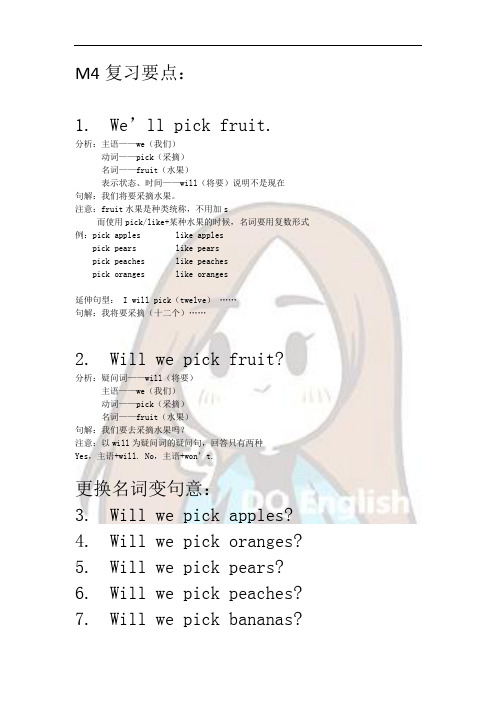
M4复习要点:1.We’ll pick fruit.分析:主语——we(我们)动词——pick(采摘)名词——fruit(水果)表示状态、时间——will(将要)说明不是现在句解:我们将要采摘水果。
注意:fruit水果是种类统称,不用加s而使用pick/like+某种水果的时候,名词要用复数形式例:pick apples like applespick pears like pearspick peaches like peachespick oranges like oranges延伸句型: I will pick(twelve)……句解:我将要采摘(十二个)……2.Will we pick fruit?分析:疑问词——will(将要)主语——we(我们)动词——pick(采摘)名词——fruit(水果)句解:我们要去采摘水果吗?注意:以will为疑问词的疑问句,回答只有两种Yes,主语+will. No,主语+won’t.更换名词变句意:3.Will we pick apples?4.Will we pick oranges?5.Will we pick pears?6.Will we pick peaches?7.Will we pick bananas?重点词(数量词的转变)复习1~10一 one 二 two 三 three 四 four 五 five六 six 七 seven 八 eight 九 nine 十 ten生词11~20+十一 eleven十二 twelve十三 thirteen十四 fourteen十五 fifteen十六 sixteen十七 seventeen十八 eighteen十九 nineteen二十 twenty二十一 twenty-one二十…以此类推 twenty-数字注意:除了1以外任何数量词+名词,名词都要用复数形式例:two applesfive pearsten orangesfifteen peachestwenty pigstwenty-five students练习1.This weekend, we are going to a ____. We will pick ____.A.zoo; fruitB. park; fruitC. fruit farm; fruit2.We will pick____ ____.A.9 appleB. 12 peachC. 20 oranges3.I am ____ to vist my grandpa this Saturday.A.goB. goingC. goes4.He ____ a farmer.A.amB. isC. are5. ____ are my favourite fruit.A. An appleB. AppleC. Apples。
小学英语新外研版(一起)六年级上册M4复习教案
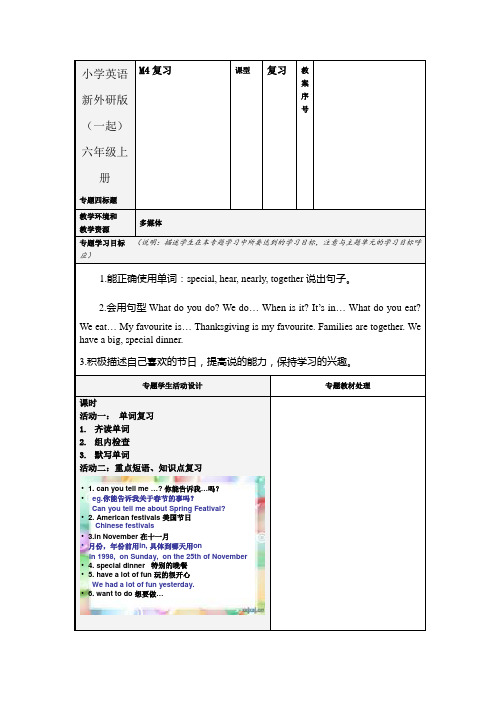
Thanksgiving is very important in America. • 2. you me American can tell festivals about
Can you tell me about American festivals?
Chinese festivals • 3.in November 在十一月 • 月份,年份前用in, 具体到哪天用on
in 1998, on Sunday, on the 25th of November • 4. special dinner 特别的晚餐 • 5. have a lot of fun 玩的很开心
2.知识点运用 3.组员和小组在小组活动中的参与度。 4.练习检测反馈情况。 (不同层次的同学进行分层次评价)
• 3. every Thanksgiving comes year Thanksgiving comes every year.
• 4. have we fun a lot of We have a lot of fun.
评价要点 教学反思
评价方法:教师评价,小组评价,个人评价,组内学生互评。 评价内容:1.单词默写情况
小学英语 M4 复习 新外研版 (一起)
课型 复习 教
案 序 号
六年级上
册
专题四标题
教学环境和 教学资源
多媒体
专题学习目标 (说明:描述学生在本专题学习中所要达到的学习目标,注意与主题单元的学习目标呼
应)
1.能正确使用单词:special, hear, nearly, together 说出句子。
外研版五年级上册英语M1 M4复习
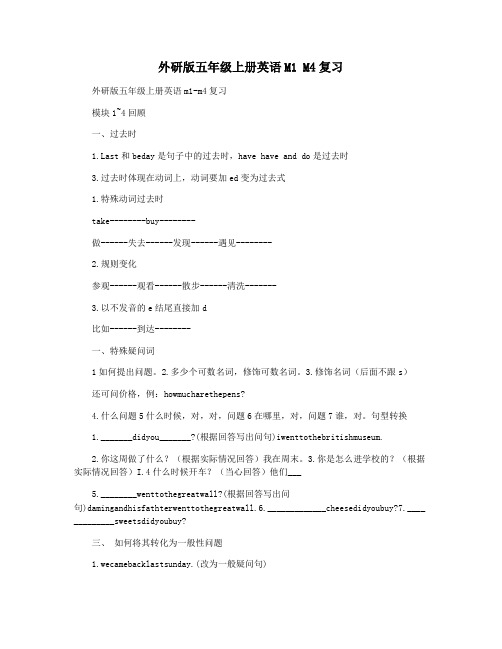
外研版五年级上册英语M1 M4复习外研版五年级上册英语m1-m4复习模块1~4回顾一、过去时st和beday是句子中的过去时,have have and do是过去时3.过去时体现在动词上,动词要加ed变为过去式1.特殊动词过去时take--------buy--------做------失去------发现------遇见--------2.规则变化参观------观看------散步------清洗-------3.以不发音的e结尾直接加d比如------到达--------一、特殊疑问词1如何提出问题。
2.多少个可数名词,修饰可数名词。
3.修饰名词(后面不跟s)还可问价格,例:howmucharethepens?4.什么问题5什么时候,对,对,问题6在哪里,对,问题7谁,对。
句型转换1._______didyou_______?(根据回答写出问句)iwenttothebritishmuseum.2.你这周做了什么?(根据实际情况回答)我在周末。
3.你是怎么进学校的?(根据实际情况回答)I.4什么时候开车?(当心回答)他们___5.________wenttothegreatwall?(根据回答写出问句)damingandhisfathterwenttothegreatwall.6._____________cheesedidyoubuy?7.____ _________sweetsdidyoubuy?三、如何将其转化为一般性问题1.wecamebacklastsunday.(改为一般疑问句)_____________________________1.iboughtsomeicecreams.(改为一般疑问句)_____________________________4.如何转换成否定句1.mrsmartboughtsomebooksforsam(改为否定句)_____________________________2.我们现在可以吃点巧克力了。
最新外研版小学英语六年级上册M4短语复习

M4.感恩节是我最喜欢的节日。
Thanksgiving is my favourite festival.1.国旗制定纪念日Flag day2.挥舞旗子 fly the flag 美国的节日3.美国人的节日 American festival/American festivals4.感恩节 Thanksgiving Day5.感恩节晚餐 Thanksgiving dinner6.元宵节 the Lantern Festival7.春节 the Spring Festival8.吃水饺 eat dumplings9.挂灯笼 hang lanterns 10.舞龙 do dragon dances 11.中秋节 the Mid-Autumn Festival 12.端午节the Dragon Boat Festival 13.我最喜欢的节日 my favourite festival 14.我最喜欢的颜色my favourite colour 15.在圣诞节 at Christmas 16.一场足球赛 a football game 17.龙舟赛 the dragon boat race 18.(吃)一顿特别的晚餐 (have) a special meal 19.一顿丰盛的家庭晚餐 a big family dinner 20.月饼 moon cake 21.许多乐趣lots of yun 22.玩得(很)开心have (lots of) fun 23.唱歌 sing songs 24.能唱歌 can sing songs 25.在电视上观看一场盛大的足球比赛 watch a big football game on TV 26.看着我们/他们 look at us/them 27.寻找(校车)look for (the school bus) 28.在秋天 in autumn。
M4 book 5高三总复习 Microsoft Word 文档
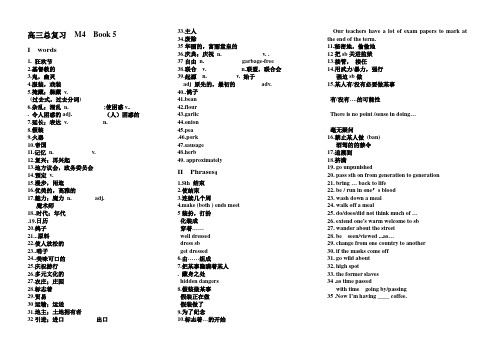
高三总复习M4 Book 5I words1. 狂欢节2.基督教的3.鬼,幽灵4.服装,戏装5.掩藏;躲藏v.(过去式,过去分词)6.杂乱;混乱n. ;使困惑v... 令人困惑的adj. (人)困惑的7.延长;表达v. n.8.假装9.火器10.帝国11.记忆n. v.12.复兴;再兴起13.地方议会,政务委员会14.预定v.15.漫步,闲逛16.优美的,高雅的17.魅力;魔力n. adj.魔术师18..时代;年代.19.日历20.鸽子21...原料22.使人放松的23..哨子24..美味可口的25.庆祝游行26.多元文化的27.农庄;庄园28.标志着29.贸易30运输;运送31.地主;土地拥有者32引进;进口出口33.主人34.废除35华丽的,富丽堂皇的36.庆典;庆祝n. v. .37自由n. garbage-free38.联合v. n.联盟,联合会39.起源n. v. 始于adj 原先的,最初的adv.40..鸽子41.bean42.flour43.garlic44.onion45.pea.46.pork47.sausage48.herb49. approximatelyII Phrases:1.Sth 结束2.使结束3.连续几个周4.make (both ) ends meet5装扮,打扮化装成穿着……well dresseddress sbget dressed6.由……组成7.把某事隐瞒着某人. 藏身之处hidden dangers8.假装做某事假装正在做假装做了9.为了纪念10.标志着…的开始Our teachers have a lot of exam papers to mark atthe end of the term.11.秘密地,偷偷地12把sb关进监狱13.接管,接任14.用武力/暴力,强行强迫sb做15.某人有/没有必要做某事有/没有….的可能性There is no point /sense in doing…毫无疑问16.禁止某人做(ban)酒驾的的禁令17.追溯到18.挤满19. go unpunished20. pass sth on from generation to generation21. bring … back to life22. be / run in one’s blood23. wash down a meal24. walk off a meal25. do/does/did not think much of …26. extend one’s warm welcome to sb27. wander about the street28. be seen/viewed ...as…29. change from one country to another30. if the masks come off31. go wild about32. high spot33. the former slaves34 .as time passedwith time going by/passing35 .Now I’m having ____ coffee.。
M4 Unit2语法复习+巩固练习-四年级英语上册(外研版三起)

M4U2语法复习+巩固练习-2023-2024学年四年级英语上册单元速记·巧练(外研版三起)一、词法1. 名词: ice 冰,冰块tomato 番茄,西红柿egg 鸡蛋flower 花dumpling 水饺pan锅;平底锅2. 动词: help 帮助,帮忙buy买put放;摆3. 量词: some 一些4. 短语: how much 多少钱make dumplings包饺子make a cake做蛋糕二、句法1. — How much is it?它多少钱?— Ten . 十元。
【解读】这是询问价格及回答的句型。
【举一反三】— How much is your ruler?你的尺子多少钱?— Two . 两元。
— How much are the bananas?香蕉多少钱?— Seven . 七元。
【拓展】how much还可对不可数名词的量进行提问,意为“多少”。
【举一反三】— How much water is there in the bottle?瓶子里有多少水?— Only a little. 只有一点。
❖how many也意为“多少”,用于对可数名词的量进行提问。
【举一反三】— How many students are there in your class?你们班有多少名学生?— Thirty. 三十名。
2. Can we help you?我们可以帮忙吗?【解读】此句是由情态动词can引导的一般疑问句,用来询问对方是否允许某人做某事。
can意为“可以;能”,后面加动词原形,没有人称和数的变化。
can的否定形式为cannot,可缩写成can’t。
【句型结构】Can + 主语+ 动词原形+ 其他?肯定回答: Yes, 主语+ can.否定回答: No, 主语+ can’t.【举一反三】— Can we play here?我们可以在这儿玩吗?— Yes, you can. 是的,你们可以。
外研版(三起)英语四上 复习M4 PPT课件
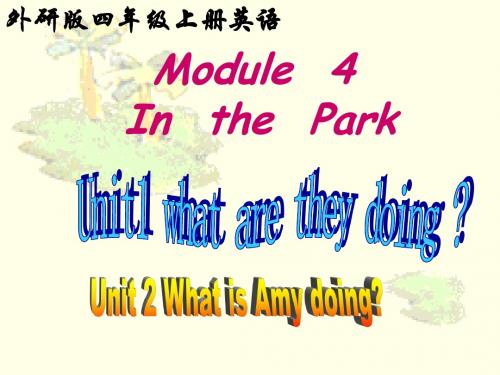
• write writing • take taking • talk talking • play playing • watch watching
game
What are you doing?
I’m playing football.
get on the bus
上公共汽车
look at 看
lots of interesting things
do taijiquan
a dragon
row
a dragon boat
play chess
drinking soybean milk 豆浆 soybean milk 正在喝豆浆
1. 让我们 2.上公共汽车 3.许多有趣的事情 4.看 5.人们 6.男人(单复数) 7.饥饿的 8.在公园里 9.在树下面 10.在湖面上 11.划龙舟 12.下象棋 13.喝豆浆
let’s
我们
lake
湖 划
get on
lots of
上(车)
许多
row
boat
船
男人(复数);
interesting 有趣的
thing 物品,东西
men
人(复数) chess
drink 象棋 喝,饮用loຫໍສະໝຸດ k atpeople看
人
park
公园
hungry 饥饿的
4 模块单词
补全字母,译出汉语 1. l__t’s ( ) 2. g__t on ( ) 3. l __ts of ( ) 4. int _ _ _sting ( ) 5.th _ _g ( ) 6. l _ _k at ( ) 7.p _ _ple ( ) 8. p _ _k ( ) 9. l _ke ( )10.r __w ( )11. b _ _t( ) • 12. m _n ( ) 13. ch _ss ( ) 14.dr__nk ( ) 15. h _ngry ( )
【广州版】五年级英语下册 M4Travel复习要点与习题
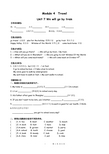
Module 4 TravelUnit 7 We will go by train【单词回顾】:乘,由________ 火车________ 离开________ 山谷_______岛_________ 出租汽车__________ 激动地,兴奋的__________【重点短语】:go travel 去旅游plan for the holiday 假期计划go by train 乘火车去Happy Valley 欢乐谷Window of the World 世界之窗come back home 回家【重点句型】:1. ---How will you go there? ---We will go by train. / By train.2. ---What will you do in Shenzhen? ---We are going to visit Window Of the World.3. ---When will you come back home? ---We will come back on October 4th.【重点分析】:1. 交通方式的表达:by+交通工具/ on footI go to school by bus. = I take a bus to school.My uncle goes to walk by underground.My aunt hoes to walk on foot. = My aunt walks to school.【随堂练习】一、根据汉语意思完成英语句子。
1. My home is ____________(近的). I ________________(步行)to school.2. Li Lei ___________ (乘地铁) to school every day.3. His father often goes to Shanghai __________ _________(坐飞机).4. If you don't want to be late, you'd better _________ a ____________(打的).5. ________ ________ _______ (骑自行车) to work is good for our health, I think.6.你每天怎样去学校?_________ ________ you get to school every day?二、请找出划线部分读音不同的单词。
M1--M4复习

Guessing game
red
yellow
blue
green
black
What colour is missing:
Good Good morning! morning!
9:00
Good Good morning! morning!
Good afternoon!
14:30
Good afternoon!
Good morning , Sam
Good morning , Sam. How are you ? Good morning , Sam. How are you ? I’m fine, thank you.
我们周围的色彩
被污染的环境
Goodbye
小朋友们,比比谁连得又快又对
• • • • • • • 1.How are you A. Good morning 2.Hello B.Bye 3.Goodbye C. I’m fine. Thank you. 4.Good morning D. Good afternoon 5.Good afternoon E. Hi 6.What’ your name? F.Yes, Ms Smart. 7.Please open the window. G.My name’s Sam
I’m fine, thank you.
And how are you?
Actions
What’s your name?
My name’s______.
What colour?
It’s red.
What colour?
It’s blue.
What colour?
It’s yellow.
外研社新标准 五年级英语备课M4复习

Module4 复习一.教学目标:(1)知识目标:1. 能运用所学的知识陈述或询问过去的行为,并会表示对他人的关心,能在实际情景中运用“What’s the matter?”询问别人怎么了?并用“I lost…”表达丢失了某物。
并可以用“That’s OK!”来回应别人的歉意。
2. 掌握单词短语及动词过去式:pair,shorts,wear,sports,shorts,find-found,take-took,lose-lost,buy-bought, 3. 理解和掌握句子:Mum bought a new T-shirt for me.What’s the matter?I lost…That’s OK!(2)技能情感目标:用一般过去时描述过去发生的事情,培养学生的学习兴趣。
二.教学重点:1.运用句型:Sb. bought …for...What’s the matter?I lost…That’s OK!三.教学难点:1.用一般过去时,描述已经发生的事情并且可以询问别人怎么了,表达对他人的关心。
2.核心语音:a: cake plane game make face tablei: bike rice time ride kite knifeoy,oi: boy point enjoy toy noise coino,oa: nose boat go coat home四.教学过程:一、热身复习1.Greetings:Good morning, boys and girls.2.Free talk:How are you today?What’s the weather like today?Where did you go ?Did you go to the supermarkrt?What did you buy ?Did you buy new clothes?3.唱英文歌:Where did you go ?二、呈现与导入【Task 1】First let’s review the new words and phrases.(闪卡) Then ,let’s have a dictation.(对子互批)【Task 2】1.观看M4UI动画,并且跟读,然后让学生朗读第一单元的主课文,并让学生集体背诵。
初中英语复习(教材)八下M4
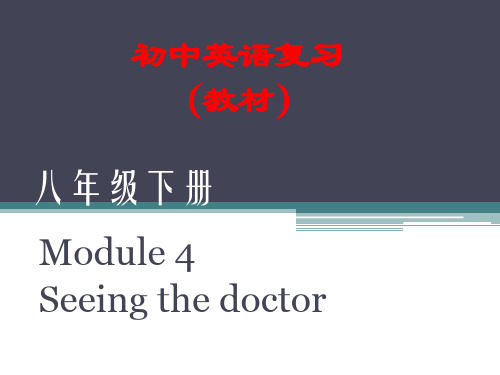
取;有规律的吃、喝
八年级下册 Module 4 单词
• 健康(状况)
• health [helθ] n.
• 健康的
• well [wel] adj.
• 心脏
• heart [hɑ:t] n.
• 积极的;活跃的 • active [ˈæktɪv] adj.
• 宠物;宠畜
• pet [pet] n.
八年级下册 Module 4 单词
face
八年级下册 Module 4 短语
• 多运动
• exercise more
• 去跑跑步 • go for a run/go running
• 感觉糟糕 • 浑身发热 • 看上去健康 • 吃健康饮食
• feel awful • be hot all over • look well/fine • have a healthy diet
八年级下册 Module 4 短语
• 感冒
• catch a cold
• 量某人的体温 • take one’s temperatቤተ መጻሕፍቲ ባይዱre
• 快餐食品
• fast food
• 参加,参与(某事•)take part in
• 健康状况很好 • in excellent condition/
• 健康状况不好 • out of condition
初中英语复习 (教材)
八年级下册
Module 4 Seeing the doctor
八年级下册 Module 4 单词
• 咳嗽
• cough [kɒf] n. v.
• 发烧;发热
• fever ['fi:və(r)] n.
• 头痛
外研版八下(M4)英语单词短语句子语法复习
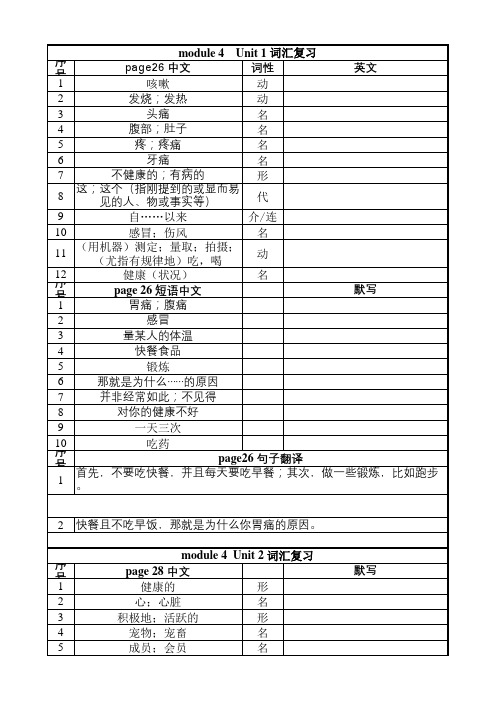
序 号
module 4 Unit 2 词汇复习 page 28 中文
1
健康的
形
2
心;心脏
名
3
积极地;活跃的
形
4
宠物;宠畜
名
5
成员;会员
名
默写
6
状况;身体状况
名
7
困得;想睡觉的
形
8
当时;那时
副
9
每天的;天天的
形
10
弱的;虚弱的
形
11
病;疾病
名
12
运动;锻炼
动
13
极讨厌的;极坏的
形
1序4 号
可能;也许 page 28 短语中文
序 号
module 4 Unit 1 词汇复习
page26 中文
词性
英文
1
咳嗽
动
2
发烧;发热
动
3
头痛
名
4
腹部;肚子
名
5
疼;疼痛
名
6
牙痛
名
7
不健康的;有病的
形
8
这;这个(指刚提到的或显而易 见的人、物或事实等)
代
9
自……以来
介/连
10
感冒;伤风
名
11
(用机器)测定;量取;拍摄; (尤指有规律地)吃,喝
动
1序2 号 1
健康(状况) page 26 短语中文
胃痛;腹痛
名
默写
2
感冒
3
量某人的体温
4
么……的原因
7
并非经常如此;不见得
8
对你的健康不好
9
一天三次
五年级英语M4-M6基础复习资料及试题

华实教育精品小班学案教师: 张老师 年级: 小五 科目: 英语 姓名:_ 日期: 2014 年 6 月 29 日 ★教学内容:期末复习(三):M4-M6基础知识:单词,词组,语法复习;期末模拟试卷 ★教学目标:复习M4-M6的基础知识,熟记单词短语,语法复习 ★重 难 点:单词短语要熟记Part I Module 4 基础复习根据图片选择方框内的单词完成句子1. are the biggest animals in the world.2. died out(灭绝) many years ago.3. run fastest in the world.4. It looks like a .5. don’t run faster than horses.6. are my favorite animals.7.can fly high in the sky.8.are the biggest animals on land.根据图片按实际情况回答问题1.Which of these animals jumps highest?2.Which of these animals flies highest?3.Which of these animals climbs highest?4.Which of these animals runs fastest?一.写出下面单词的比较级和最高级形式Fast ________ ______________ tall ____________ _____________ Thin ____________ _____________ fat ____________ _____________ Hot ____________ _____________ big ____________ _____________ Early ____________ _____________ late____________ _____________Beautiful ____________ ___________ delicious ____________ _____________ Good ____________ _____________ many ____________ _____________ Boring ____________ _____________ slowly ____________ _____________ Friendly ____________ _____________二.选择正确答案。
外研版九年级上册m4英语知识点
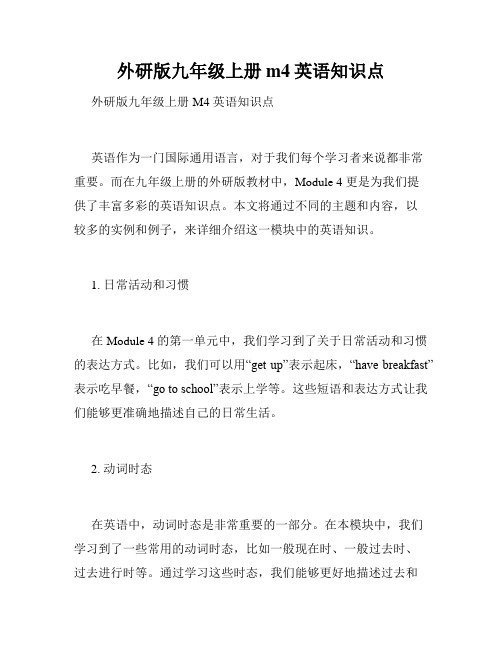
外研版九年级上册m4英语知识点外研版九年级上册 M4 英语知识点英语作为一门国际通用语言,对于我们每个学习者来说都非常重要。
而在九年级上册的外研版教材中,Module 4 更是为我们提供了丰富多彩的英语知识点。
本文将通过不同的主题和内容,以较多的实例和例子,来详细介绍这一模块中的英语知识。
1. 日常活动和习惯在 Module 4 的第一单元中,我们学习到了关于日常活动和习惯的表达方式。
比如,我们可以用“get up”表示起床,“have breakfast”表示吃早餐,“go to school”表示上学等。
这些短语和表达方式让我们能够更准确地描述自己的日常生活。
2. 动词时态在英语中,动词时态是非常重要的一部分。
在本模块中,我们学习到了一些常用的动词时态,比如一般现在时、一般过去时、过去进行时等。
通过学习这些时态,我们能够更好地描述过去和现在的事情。
例如,我们可以用“did”表示过去发生的事情,“am/is/are + doing”表示正在进行的动作等。
3. 表达能力的提高Module 4 的第二单元中,我们学习到了一些有关表达能力和交流的内容。
通过模仿不同的陈述句、疑问句和感叹句,我们可以掌握更多的表达方式,并能够更流利地进行英语对话。
例如,我们可以通过练习变换陈述句中的语序,将其变成一般疑问句或感叹句,进而提高我们的英语表达能力。
4. 语法知识的巩固在学习英语的过程中,语法知识是我们必须掌握和巩固的一部分。
在 Module 4 中,我们通过复习一些基础的语法知识,如名词的单、复数形式,及物和不及物动词的区别,人称代词和物主代词的用法等。
这些知识点的学习和掌握将使我们在后续的学习中更加得心应手。
5. 阅读和理解模块中的最后一个单元,我们将学习如何进行阅读和理解,并通过阅读文章的方式来提高我们的英语水平。
通过阅读文本,我们可以了解不同的故事情节、人物形象和情感表达。
同时,通过回答问题、完成练习和写作作业,我们能够更好地锻炼阅读理解能力,提升我们的写作水平。
M4 期末总复习
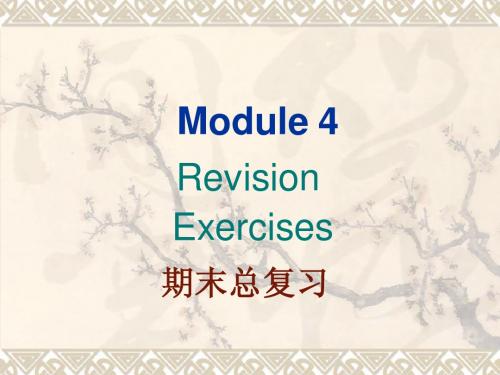
1.What are you going to do in the park
tomorrow?
2.How is Tim going to school next week?
3. When are the students going to eat ice cream?
4. Who are you going to have a picnic with tomorrow? 5. What are they going to buy at the supermarket ? 6. What is LiPing going to do after dinner? 7. Who is going to visit Moon Park next month?
Module 4 Revision Exercises
期末总复习
I. Choose the best answer:
1. February in 2002 has _____ days.
A. 29 B. 28 C. 30 D. 31 2. People sit at home and _______ the beautiful moon. A. look at B. watch C. see D. look 3. Give me the sandals, the _____ in the box. A. one B. ones C. pairs D. pair 4. ______ you ever ______ a letter this week? A. Did; write B. Do; write C. Have; written D. Will; write
1:将要做的动作。
2:常见关键词:tomorrow…… next…… after…… in (a month) 3:结构: be going to + 动词原形
外研社新标准 六年级上册M4复习

在高年级日常教学中,适时的渗透一些规则的、基本的音标知识。对其中有规律可循的音和词加以归纳学习,这样在课后,让学生在遗忘时可以有一个记忆的线索,同时在课堂上,教师可以让学生根据这一知识自己去学拼简单的单词,并且对正确的学生给予鼓励和表扬。几次成功的尝试会使得他们更有兴趣去学习,在预习和复习时能积极参与进去,并乐在其中。
2.能运用重点句型介绍相关节日的活动。
3.情感态度目标: 对比中西方节日异同,增强爱国情怀。
二、教学重点难点:
运用本课所学句子描述相关的节日的主要活动。
第二标:达成目标
三.教学过程:
1.Warm-up: 闪卡复习Module 4单词以及相关词组。
2. 听写Module 4词组,组内批改,组长统计本组听写情况。
5. 舞龙________
6. Mid-Autumn Festival________
7. 许多乐趣________
8. S吃一顿特殊的家庭晚餐___________
10. Our favourite festival_________
四.写作练习
Write a short passage about your favourite festival.
e.g. Spring Festival
My favourite festival is Spring festival.
We eat a big family dinner .
We...
五.Homework
外研社新标准 六年级上册 Module 4 Review
第一标:设置目标
【课堂目标】(2 min)
一、教学目标:
1.能掌握单词和词组:festival, special, meal, sound,moon cake, race, lantern, hang, the Dragon Boat Festival, the Mid-Autumn Festival, the Lantern Festival
3B M4复习(答案)

3BM4复习单词组:身体body 泰国T hailand 我自己myself 日本J apan你自己yourself 在儿童节on C hildren’s D ay头head 今天today手指finger 拍照take a photograph 膝盖knee 进行班级聚会have a class party 脚foot 和我的父母一起with my parents 脚(复数)feet 6月1日肩膀shoulder 7月14日10月1ar 手臂m 日手hand 1月的第二个周六腿leg 3月3日脚趾toe 5月5日简单the first of J une the fourteenth of J uly the first of O ctoberthe second S aturday of J anuarythe third of M arch the fifth of M ay 的easy 每个人everyone 有趣的funny玩抛接球游戏play catch 唱首伸展你的手臂stretch your arms 歌sing a song举起你的手建造你们自己的房raise your hands 子make your own houses跺你的脚忙碌stamp your feet 的busy 拍你的手饥饿clap your hands 的触摸你膝hungry 盖强壮touch your knees 的去公strong 园go to the park 害怕的afraid 电影院cinema 在那里over there 动物园zoo 钓鱼go fishing 在中国in C hina 进来come in 英国the UK 烧水boil the water 新加坡S ingapore离开go away作文:Children’s Day______________________________________________________________________________________________________________________________________________________________________________________________________________________________________________________________________________________________________________________________________________________________MyselfToday is the first of June.It is Children’s Day.In the morning,we have a class party at school.In the afternoon,we go to the park.We have a picnic in the park.How happy!Hi,I’m Ben.I’m a boy.I’m ten.I’m tall.My eyes are big.I can see with my eyes.My legs are long.I can run fast.I’m happy.。
M4复习课件
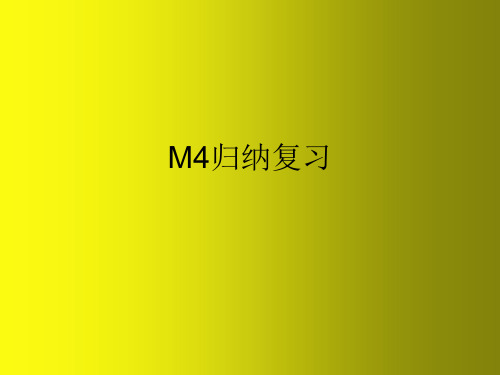
5.not only ... but also ... 不仅......,而且...... 当 not only … but also 连接的两个成分作主 语时,符合就近原则 例如:
Not only the students but also the teacher likes the sea.
will on interesting paper rain write life chalk machine ruler
What will 1._______ be like in 200 years? Teachers won’t 2.________ on the blackboard with 3.________ in the future. Students won’t do their homework on 4.________, and we won’t draw a line with a 5._______. At that time, every student will study 6. _______ the computers. And at the weekend, students can go cycling with their friends---robots. That would be very 7.___________. There will be many 8.__________ on the farms, and they do lots of work. What about the climate then? There won’t be much 9.________. That 10.________ bring people many problems.
- 1、下载文档前请自行甄别文档内容的完整性,平台不提供额外的编辑、内容补充、找答案等附加服务。
- 2、"仅部分预览"的文档,不可在线预览部分如存在完整性等问题,可反馈申请退款(可完整预览的文档不适用该条件!)。
- 3、如文档侵犯您的权益,请联系客服反馈,我们会尽快为您处理(人工客服工作时间:9:00-18:30)。
• 一、单项选择 • 1、 Everyone ______ English hard in our class . • A. study B. studys C. studies D. studying • 2、---Will there be schools in the future ? • ---No , there __________ . A. isn’t B. won’t be C. won’t D. will be not • 3、---Will they send their homework _____ the teacher ____ email ? • ---Yes , they will . • A. for ; by B. at ;with C. to ; by D.ห้องสมุดไป่ตู้by ; to • 4、--- ______ there any fruit in the fridge ? • --- No , there isn’t . • A. will B. will be C. Is D. Are
9.祈使句的答语 肯定句: yes, I will. 否定句:sorry, I won’t.
---Don’t eat anything in the library. ---___________.
---Be sure to have breakfast every day. ---________.
短语: 1.在家里学习 study at home in 20 years' time 2.在20年之后 get information on the 3.在网络上得到信息 Internet 4.在网络上问他们老师问 ask their teachers 题 questions by Internet check the students' level 5.核查学生们的水平 not any more 6.不再。。。 have a lot of homework 7.有一些作业去做 todo 8.有一些空余的时间 9.实现
• 二、句型转换 • 1、He will stay at home next week . (改为一般疑问句并作 肯定回答) • -----_______ ______ ______ at home next week ? • ----- ______ , ______ ______ . • 2、We’ll use the sun to heat(使…热) our homes . (改为同 义句) • We ____ ____ ____ use the sun to heat our homes . • 3、They’ll have long holidays and lots of free time .(改 为否定句) • They ____ have long holidays ______ lots of free time . • 4、There will be a computer on every desk .(改为一般疑 问句并作否定回答) • -----______ ______ ______ s computer on every desk ? • ----- _____, ______ ______.
How often do you have a sports meeting ?
A class lasts for forty years.
How long does a class last ?
8.sth come true 某事实现
语序不可颠倒
I hope ______________(梦想实现).
19.工作时间
working hours
• • • •
20.做轻而简单的工作 21.有长的假期 22.和。。。一起玩 23.找到去旅行的新方法 do light and easy work have long holidays play with find new ways to travel
一般将来时的基本结构: be (am, is, are)going to+动词原形 (复习) will +动词原形
• 66他们将会有许多空余的时间。 • They __________ have a lot of __________ time. • 67 每个家庭将会有一架小型飞机。 • __________ family will have a small__________. • 68我们将不再乘公交汽车或自行车去旅行。 • We __________travel __________bus or bike__________ __________. • 69 也许将会在空中出现交通堵塞。 • Maybe there’ll be __________ __________ in the __________. • 70 我们只做轻的容易的工作。 • We’ll only do __________ and __________ work.
• 5、 Do you think there _____ no students at school in the furure ? • A. are B. will C. will be D. will have • 6、I ______ a small car next month( 月). • A. have B. has C. will have D. will has • 7、The teacher writes on a blackboard _____ chalk . • A. by B. with C. for D. at
38 It’ll be cheap__________(travel) everywhere by plane. 39 __________(work) hours will be short. 40There __________( be not) any teachers in 10 years.
31 In the future ,the students__________( not use) books. 32 There’s no__________(rain) today , But it will be__________(rain) tomorrow. 33 The students will have a lot of homework __________(do). 34 In 50__________(year) time,maybe there won’t be any water. 35 They can learn a lot of knowledge by__________(send) emails. 36 We can’t go out to have a picnic because it is raining________(heavy) outside. 37 The girl is able to__________(sing) the song in English.
21 ask__________(对应词) 22 able__________(同义短语) 23 free __________(汉语意思) 24 wind __________(adj.) 25 cheap__________(反义词) 26 long __________(反义词) 27heavy________(反义词) 28 easy__________(反义词) 29rise__________(过去式) 30 will___________(过去式)
• 71 工作时间将会缩短,这样人们的假期就会长。 • Working _________will be _________ so people will have _________ holidays. • 72 海平面也会提高。 • The sea level will __________ __________ __________. • 73 今晚将有小雨。 • There will __________ __________ __________ this evening. • 74 将来的学校会是什么样子? • What will schools __________ __________ in the future? • 75 他的梦想终于实现了。 • His dream __________ __________ at last.
how often 对 every+时名单, 次数+ 时间单位 提问
how long 对 for + 时间段 提问
Kathy will leave school in three years. How soon will Kathy leave school ?
We have a sports meeting every year.
3. take (从说话人所在地)带走
bring 带(到说话人所在地)来
carry 无方向性,单指携带运载
Please __ away the litter when you leave.
Mr.Li told you to _ your homework to school tomorrow
The bag is too heavy for me to ___.
• 61学生们在将来使用课本吗? • ____________ students __________books in the future. • 62学生们将在他们的电脑上与老师们交谈。 • Students will talk __________their teachers ________their computers. • 63 也许将来没有学校了。 • __________there __________be any schools. • 64 学生们将使用电脑并从网上获取信息。 • Students will use computers and __________ __________on the Internet. • 65 老师将不再使用粉笔在黑板上书写了。 • Teachers __________ use __________ on blackboard __________ __________.
